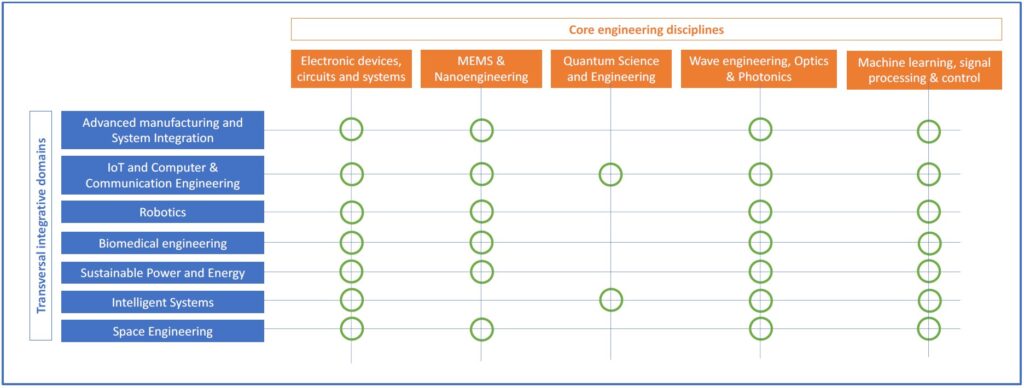Overview of the research
With more than 60 faculty members installed on three sites (EPFL main campus in Lausanne, Microcity in Neuchâtel and Campus Biotech in Geneva), the Institute of Electrical and Micro Engineering (IEM) has excellent infrastructure in terms of personnel, buildings and laboratories.
IEM is steadily installed in the top 10 departments in Electrical and Electronics Engineering worldwide (QS ranking 2023). Some of our faculty are members of the most prestigious professional societies as the US National Academy of Engineering, The American Academy of Arts & Science, the Swiss Academy of Engineering Sciences or the Academia Europaea and have been awarded major prizes (Zeiss Research Award, IEEE Harry Goode Award, Helmoltz Prize, Fresnel Prize).
IEM develops its research in a wide range of core engineering disciplines that find applications in scientifically important and societally relevant transversal integrative domains.

Core engineering disciplines
- Electronic Devices, Circuits and Systems: ULSI digital circuits and systems, Mixed-signal VLSI circuit design, Energy efficient, low power electronics for digital and analog information processing, Design methods and tools, Integrated sensors, Nano-electronics beyond CMOS, Computational electromagnetics.
- MEMS & Nanoengineering: Nanomaterials and novel functional materials, Nanofabrication tools and processes, MEMS, sensors, and actuators, Microfluidics and the interface to biology.
- Quantum Science and Engineering: Quantum devices and fabrication technologies for scalable quantum systems, Quantum EDA, Quantum-classical interconnects, Quantum optical systems, Quantum sensing, Quantum security in IoTs.
- Wave engineering, Optics & Photonics: Nanoscale Optics, Plasmonics, Metamaterials, Integrated Photonics, Detectors and Image sensors, Quantum optical systems, Imaging systems, Nano-semi-conductors-2D materials, Fiber systems, Laser processing systems, Electromagnetic Compatibility (EMC), Lightning, Time Reversal, Antennas and Propagation in Biological tissues, Acoustic and Electromagnetic metamaterials and metasurfaces.
- Machine learning, signal processing & control: Machine learning, Learning and inference, Signal and image processing, Sensing and acquisition, Application domains.
Transversal integrative domains
- Advanced Manufacturing and System Integration: Micro-systems (MEMS) manufacturing (based on clean-room processes), Additive/subtractive manufacturing, Sustainable manufacturing, Transforming/functionalizing materials, Manufacturing at a system level: packaging, interfaces and system integration.
- IoT and Computer & Communications Engineering: Systems for telecommunications, Embedded ultra-low power systems, IoT/Edge AI nodes, Low-power, Co-design methods and tools, Computing architectures, Wearable systems, Photonics and Wave Engineering.
- Robotics: Artificial intelligence, Bio-inspired robotics, High-precision robotics, Human-robot interaction, Human motion analysis, Manipulators and exoskeletons, Mobile robots, Robots for education, Shared control of prostheses.
- Biomedical Engineering: Biomedical Signal Processing and Computational Medical Imaging, Biosensors, medical devices and implantable systems, Medical instrumentation and robotics, Autonomous and smart neurotechnologies.
- Sustainable Power and Energy: Smart grids, Power electronics, Electric power transmission and distribution, Electro-mechanical systems, Advanced semiconductor devices, Advanced solar cells and modules.
- Intelligent Systems: Intelligent Systems for medicine, Intelligent Assistive Robotics, Decentralized Edge AI Infrastructure, Digital Twins.
- Space Engineering
Interdisciplinary integration
IEM is a key actor of the interdisciplinarity research integration by its contributions to many centers at EPFL. The following EPFL centers see a major involvement of IEM members, either as center scientific directors or as key scientific leader:
- Energy Center
- Swiss Competence Center of Electrical Infrastructure (SCCER-FURIES)
- EPFL Center for Imaging (IMAGING)
- Micro-Manufacturing Science and Engineering Center (M2C)
- Center for Artificial Muscles (CAM)
- Center for Neuroprosthetics (CNP)
- Centre for Biomedical imaging (CIBM)
- NCCR Robotics
- Center for Intelligent Systems (CIS)
- EcoCloud Center (ECOCLOUD)
- EPFL Hub for Machine Learning Theory and Methodology with Applications (ML)
- Integrated Systems Center (CENTRE-SI)
- Swiss Data Science Center (SDSC)
- EPFL Space Center (eSpace)
- EssentialTech Center
- Center for Learning Sciences (LEARN)
